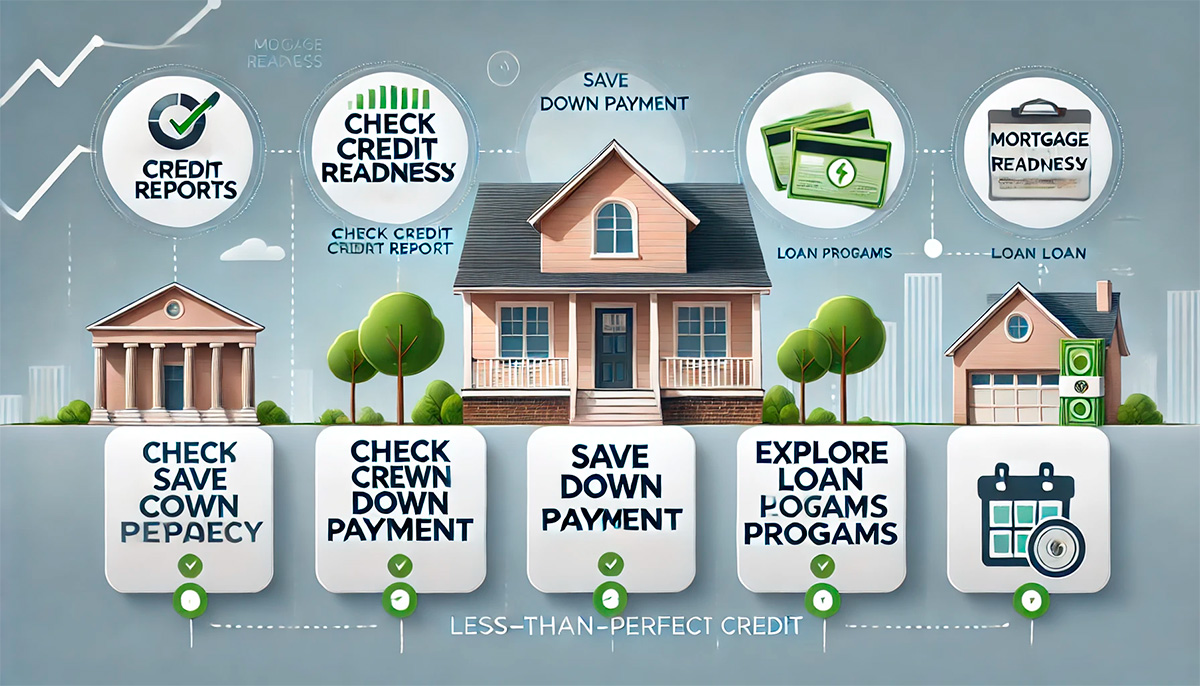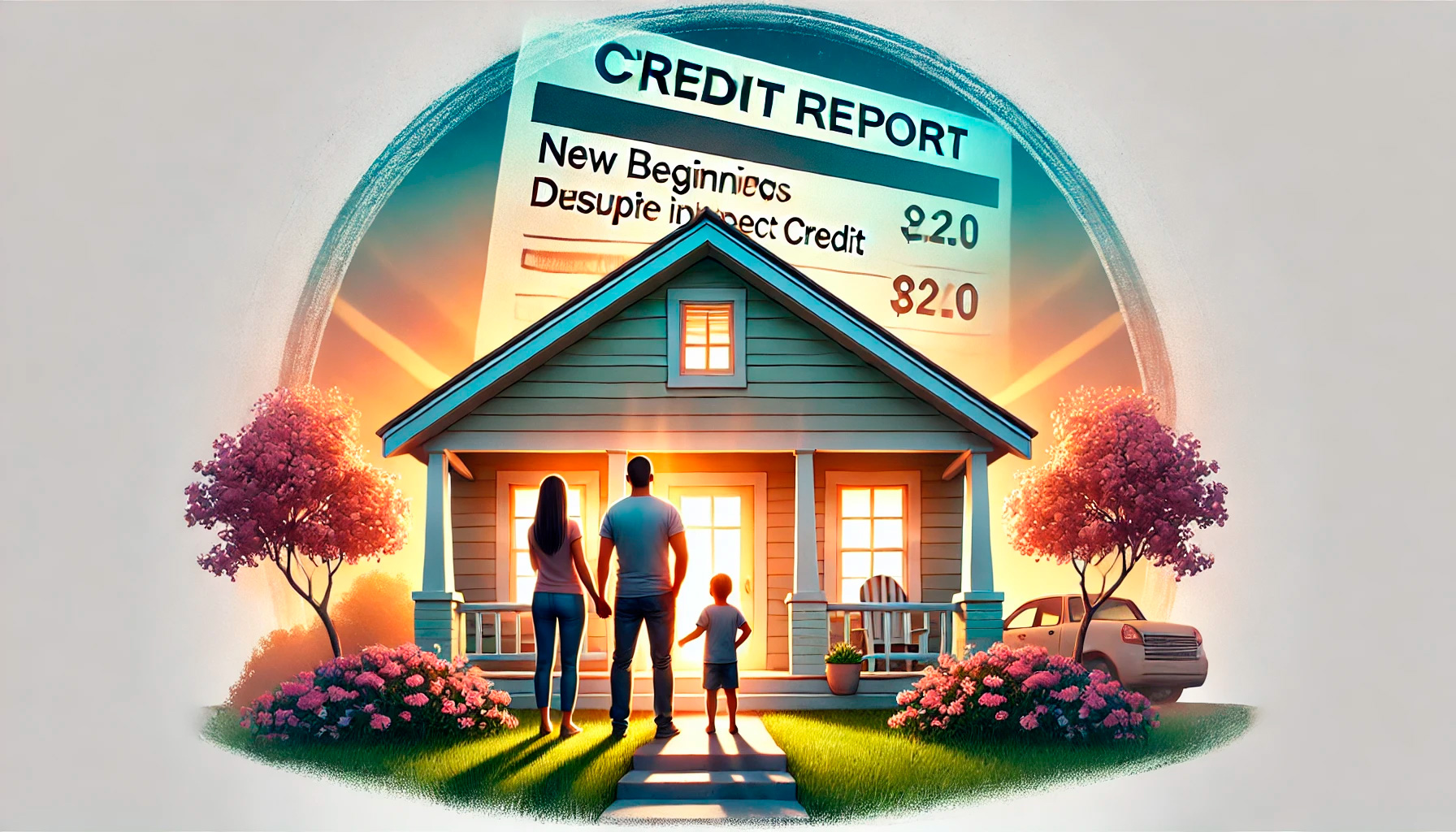Owning a home is a dream for many, but for those with less-than-perfect credit, the path to homeownership can feel daunting. While having a strong credit score makes securing a mortgage easier, it’s not the only factor lenders consider. Even with a flawed credit history, there are strategies and options available to help you achieve your goal of owning a home. Understanding how to navigate the mortgage process with imperfect credit is the first step toward turning your dream into reality.
How Credit Affects Mortgage Approval
Your credit score is one of the primary factors lenders use to assess your mortgage application. It reflects your financial reliability and influences the interest rates and loan terms you’re offered. Generally, higher scores result in lower interest rates and better loan terms, while lower scores may lead to higher costs or stricter requirements.
For example, a borrower with a credit score of 750 may qualify for a 4% interest rate, while someone with a score of 620 might face rates closer to 6%. Over the life of a 30-year mortgage, this difference can add up to tens of thousands of dollars. Understanding where you stand and what lenders look for is critical to finding a path forward.
Steps to Prepare for a Mortgage with Poor Credit
1. Check Your Credit Report and Score
The first step in preparing for a mortgage is understanding your credit profile. Obtain your credit reports from the three major credit bureaus—Experian, Equifax, and TransUnion—and review them for inaccuracies, such as incorrect account balances or late payments that were actually made on time. Dispute any errors you find, as correcting them can boost your score quickly.
Knowing your credit score also helps you determine your eligibility for different loan programs. Some government-backed loans, like FHA loans, have more lenient credit requirements, making them accessible to borrowers with lower scores.
2. Focus on Improving Your Credit
While it’s possible to secure a mortgage with poor credit, improving your score before applying can open up better opportunities. Focus on paying down high-interest debts to reduce your credit utilization ratio, which accounts for 30% of your score. Consistently paying all bills on time is another impactful step, as payment history makes up 35% of your score.
If you’re unable to pay off large balances quickly, consider consolidating debts to lower monthly payments and improve your financial stability. Building positive financial habits over several months can significantly improve your credit and increase your chances of mortgage approval.

3. Save for a Larger Down Payment
When applying for a mortgage with less-than-perfect credit, a larger down payment can offset lender concerns. A down payment of 20% or more shows financial stability and reduces the lender’s risk, increasing your chances of approval. It also lowers your loan-to-value (LTV) ratio, which can result in better terms even with a lower credit score.
If saving a large down payment feels overwhelming, explore programs that help first-time buyers with grants or low-interest loans to cover down payment costs. Many state and local governments offer assistance programs specifically designed for buyers with limited resources.
4. Consider Government-Backed Loan Programs
Government-backed loans, such as FHA, VA, or USDA loans, are excellent options for borrowers with imperfect credit. These programs are designed to make homeownership more accessible by offering lower credit score requirements and smaller down payment options. For example, FHA loans typically accept scores as low as 580 with a 3.5% down payment.
VA loans, available to eligible veterans and active-duty service members, often have no minimum credit score requirement and require no down payment. USDA loans, which are aimed at buyers in rural areas, also offer lenient credit requirements and low or no down payments. Research these programs to see if you qualify for their benefits.
5. Get Pre-Approved
Pre-approval is an important step for any homebuyer, but it’s especially crucial if you have poor credit. During the pre-approval process, lenders evaluate your financial situation and provide a clear picture of how much you can afford to borrow. This not only helps you set a realistic budget but also shows sellers that you’re serious about purchasing a home.
When seeking pre-approval, be upfront with lenders about your credit history. Some lenders specialize in working with borrowers who have less-than-perfect credit and can offer guidance on improving your chances of approval.
Working with Lenders
Explore Non-Traditional Lenders
In addition to traditional banks, consider working with credit unions or online mortgage lenders. These institutions often have more flexible credit requirements and may be willing to consider alternative data, such as rent and utility payment histories, when evaluating your application. Some online lenders specialize in serving borrowers with poor credit, offering tailored solutions to meet their needs.
Negotiate Terms
If your credit score makes it difficult to secure favorable terms, don’t be afraid to negotiate. Discuss your financial stability, down payment amount, and employment history with your lender to demonstrate your reliability. Lenders may be willing to adjust terms based on these factors, even if your credit score isn’t ideal.
Consider a Co-Signer
If you’re struggling to qualify for a mortgage on your own, a co-signer with strong credit can improve your chances of approval. The co-signer agrees to share responsibility for the loan, giving the lender additional assurance. However, this arrangement carries risks, as the co-signer’s credit will be impacted if you fail to make payments.

Tips for Managing Your Mortgage
Budget Wisely
Once you secure a mortgage, careful budgeting is essential to ensure you can meet your monthly payments. Account for additional costs like property taxes, homeowners insurance, and maintenance expenses when planning your budget. Avoid taking on new debts or making large purchases that could strain your finances.
Build Equity
As you make mortgage payments and your home value increases, you’ll build equity—a valuable financial asset. Consider refinancing your loan in the future to take advantage of better terms once your credit improves. Refinancing can lower your monthly payments, reduce your interest rate, or eliminate private mortgage insurance (PMI).
Conclusion: Achieving Homeownership with Imperfect Credit
Securing a mortgage with a less-than-perfect credit history may require extra effort, but it’s far from impossible. By understanding your credit profile, improving your financial habits, and exploring specialized loan programs, you can navigate the challenges and achieve your dream of homeownership. Work with lenders who understand your situation, save for a substantial down payment, and stay committed to building a stronger financial foundation.
Homeownership is within reach, even with imperfect credit. Take the first steps today, and turn your challenges into opportunities on the path to your new home.

